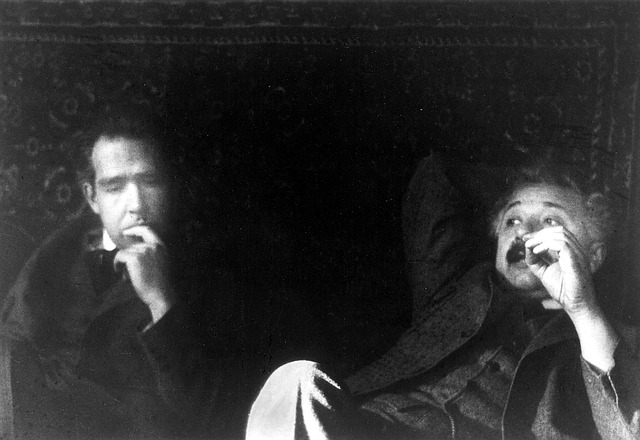I recently read Carlo Rovelli’s insightful book, Seven Brief Lessons on Physics, and came across a powerful anecdote on the virtues of self-doubt.
The Danish physicist Niels Bohr and Albert Einstein were among the greatest intellectual rivals in science. They engaged in a series of public debates about quantum mechanics, which describes how things work at the atomic level. Einstein opposed the “uncertainty principle,” which says that it’s impossible to calculate with certainty the position and momentum of subatomic particles—like electrons—and that the very act of measuring these particles alters their reality. All physicists can do is to calculate the probability of a particle’s location, but not its actuality.
This “spooky” principle deeply bothered Einstein. He believed in a reality that existed independently of observation. Mocking the theory, he famously asked Bohr, a proponent of the uncertainty principle, whether God plays dice with the universe.
Despite their sharp intellectual disagreements, the relationship between Bohr and Einstein was one of mutual respect and admiration. True to his form, Einstein came up with a series of thought experiments to challenge the uncertainty principle. During the Solvay conferences on physics, Einstein would arrive for breakfast in the dining room of the Hotel Metropole and giddily announce that he had invented another thought experiment that falsified the uncertainty principle.
Although others ignored Einstein’s eccentricities, Bohr took them seriously. He would think about Einstein’s new thought experiment all day. By dinner, he would usually have an answer to put Einstein in his place. Einstein would then retreat to his hotel room and descend to breakfast the next day armed with a brand new thought experiment.
This intellectual chess game continued until Einstein’s death. A few years later, when Bohr himself died, he left behind a drawing on his blackboard. The drawing wasn’t a grand revelation or defense of Bohr’s ideas. Rather, it was a light-filled box—part of a thought experiment that Einstein had posed to challenge Bohr.
Until his final breath on Earth, Bohr doubted himself. He embraced Einstein’s challenges, believing them to make his ideas stronger, not weaker. His defense of quantum mechanics was based—not on fortitude—but on self-doubt.
The Bohrs of the world are a rare breed. The importance of confidence is etched deeply into our psyche. We equate conviction with competence. We drown out doubt with a flood of certainty. Corporate executives act like Neanderthals in suits and value chest-beating, instead of frankly acknowledging the complexity of a problem or the hesitation that should accompany an answer.
To be sure, extreme levels of self-doubt can be crippling. The dose makes the poison. A moderate amount of self-doubt can be a weapon, rather than a liability.
Here’s why.
Self-doubt is the hallmark of a great thinker. Doubt deflates the pressure to deliver “the right answer” with conviction. Instead, it provides room to experiment and play with tentative ideas. Einstein began his article on how light is made up of photons with a hesitant “it seems to me.” Darwin introduced evolution with “I think.” Faraday spoke of the “hesitation” he experienced when he introduced magnetic fields. Although the expression of self-doubt is a non-starter for most politicians, John F. Kennedy embraced it when he pledged to put a man on the Moon. He was unusually candid in admitting that he was asking his country to take a leap into the unknown: “[T]his is in some measure an act of faith and vision,” he explained to the American public, “for we do not now know what benefits await us.”
Conviction breeds arrogance and hubris. It leads to complacency. The moment you think you have the right answer is the moment you start ignoring inconvenient facts and stop learning. Self-doubt, in contrast, opens up the mind. If you doubt your answers, you’ll be receptive to revising them. With doubt, you’re far less likely to start lighting cigars and popping champagne corks at the first sight of success.
Regardless of how many public speeches I’ve given, the doubt I feel every time I step up to the podium keeps me on my toes. I rehearse every speech until I know it cold. I over-prepare for every law school class I teach.
When we associate doubt with weakness, perfectionism gets the best of us. When we feel the slightest twinge of doubt, we deny ourselves permission to proceed until we feel confident. But confidence never arrives. We wait, we wait, and we wait for doubt to dissipate, until someone else—who managed to rise above her doubt while we let ours consume us—speeds past us to the finish line.
The next time you start to feel doubt creeping in, resist the tendency to reject it. Embrace it. In a world filled with know-it-alls, you’ll stand out, and in a good way.
Bold


